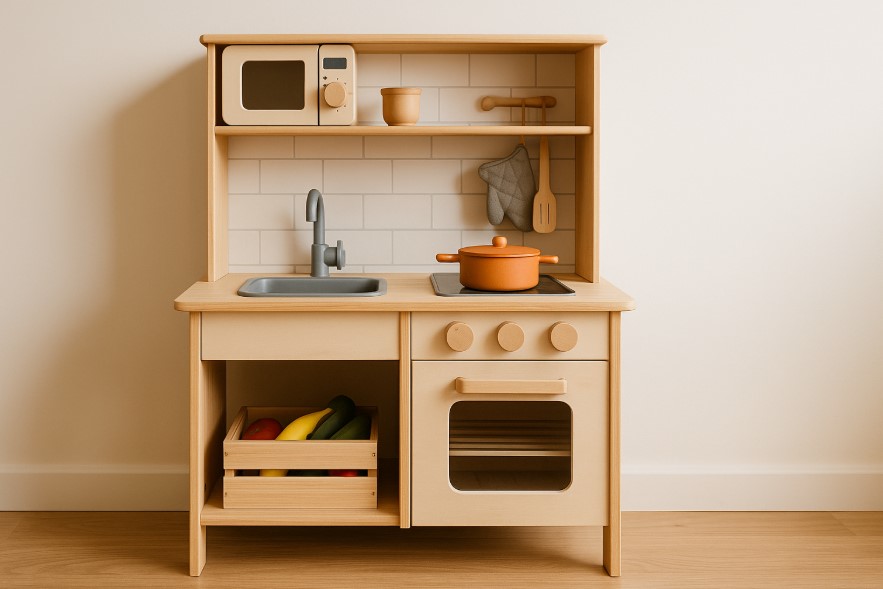Parenting
How Do Wooden Play Kitchens Boost Creative Development?

Kids love to pretend. From talking to stuffed animals to running an imaginary restaurant, make-believe is more than just fun; it helps shape key skills as kids grow. Wooden play kitchens are more than adorable furniture for your child’s room. They spark creativity, teach essential skills, and help kids learn through hands-on play. If you’re wondering how a toy kitchen can support your child’s development, keep reading; you might be surprised by what these tiny stovetops can do.
Imaginative Play Starts Here
The beauty of a kitchen play set lies in its ability to open up an entire world of possibilities. Your child isn’t just stirring pretend soup; they’re hosting a tea party in Vermont, serving pancakes in Minnesota, or running a food truck in downtown Austin. This kind of play allows them to explore different roles, act out real-life scenarios, and stretch their imagination without limits.
Wooden kitchens in particular encourage slower, more intentional play. With fewer buttons and flashing lights than plastic versions, kids rely more on their creativity to bring the scene to life. Suppose your child is cooking up a storm in California or setting the table in Oregon; each moment spent in pretend play builds confidence and imagination.
Language and Social Skills Grow Naturally
A wooden play kitchen becomes a stage for storytelling. As children pretend to cook, order, or serve, they use words in new ways. Suddenly, your four-year-old is announcing dinner specials like a pro in New York or taking a customer’s order with a Southern drawl in Georgia. This pretend dialogue helps expand vocabulary and improve sentence structure, even if no adult is involved.
When siblings or friends join in, the kitchen transforms into a shared social space. Kids learn to take turns, collaborate, and express themselves clearly. From small towns in Indiana to neighborhoods in Arizona, kids everywhere benefit from these early lessons in communication and cooperation.
Problem-Solving in a Playful Way
Think of a wooden kitchen as a mini lab for early problem-solving. What happens when the “pasta” is too salty? What do you do when the “oven” breaks? How many plates are needed for three guests? In every scenario, your child is challenged to think critically and find solutions.
These moments of pretend decision-making build cognitive flexibility. If they’re planning a dinner party in Washington or figuring out how to fix the “sink” in Ohio, kids learn to approach problems with curiosity and creativity. And the best part? They’re enjoying every minute of it.
Boosts Fine Motor Skills Without the Pressure
Wooden knobs, tiny spoons, and pretend food pieces might seem simple, but they do wonders for developing fine motor skills. Turning, stirring, stacking, and sorting all work the small muscles in fingers and wrists. These motions prepare kids for real-life tasks like holding pencils, buttoning shirts, or tying their shoes.
In places like Michigan and Wisconsin, where cold winters keep kids indoors, a wooden kitchen offers a warm and engaging way to stay active without screen time. Each motion, no matter how small, is a step toward better coordination and control.
Encourages Independence and Confidence
Something is empowering about having a space that’s all theirs. A wooden kitchen gives kids the freedom to create, clean, and manage a “home” environment. They decide what’s on the menu, who gets served, and how everything is arranged. It’s their world, and that builds confidence.
The second time your child uses a kitchen play set, they’re already more comfortable. Maybe they remember how to “bake cookies” or where to “store groceries.” These repeated routines foster a sense of ownership and accomplishment; something kids in Colorado, Texas, or anywhere in between can carry into daily life.
Wooden play kitchens do more than entertain. They help kids grow emotionally, mentally, and socially through imaginative play. From boosting language skills in Idaho to refining motor skills in Illinois, these simple toys leave a big impact. If you’re looking for a way to support your child’s creativity and development, a thoughtfully chosen toy kitchen might be the ideal way to spark your child’s imagination.
-

 Entertainment1 month ago
Entertainment1 month ago123Movies Alternatives: 13 Best Streaming Sites in 2026
-

 Entertainment2 months ago
Entertainment2 months ago13 Free FMovies Alternatives to Watch Movies Online in 2026
-

 Entertainment1 month ago
Entertainment1 month ago13 Flixtor Alternatives to Stream Free Movies [2026]
-

 Entertainment2 months ago
Entertainment2 months agoGoMovies is Down? Here are the 11 Best Alternatives






